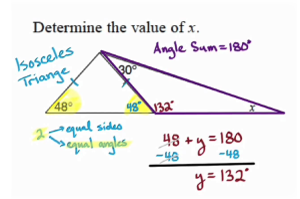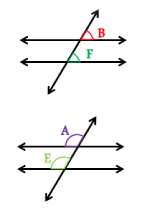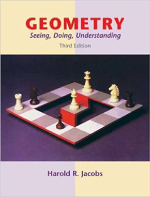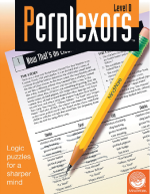|
 MATH ONLINE & INTERACTIVE MATH ONLINE & INTERACTIVE
Geometry
—with an option for
honors-level geometry
In geometry, many students recognize for the first time the beauty and power of logic. They also discover a new and practical application for the algebra they've already learned. They create chains of reasoning, often using simple algebra to build knowledge from just a few givens — and the power of math becomes obvious.
Equally important, when solving geometric problems, students practice skills important for understanding the world:
 deductive reasoning; deductive reasoning;- spatial understanding;
- problem-solving.
Along the way, they strengthen a variety of mental muscles like visualization and sustained concentration.
Course content
Geometry is a fast-paced yet focused study that emphasizes the math topics and operations most frequently encountered in other high school courses — like chemistry and physics. The course also addresses topics that frequently appear on standardized tests like the SAT and ACT.
The instructor will periodically assess the students with regular examinations.
Homework usually requires roughly 3.5 hours per week.
Materials to purchase
Students will required to purchase these texts:
 Geometry: Seeing, Doing, Understanding by Harold R. Jacobs. Third edition. — Please note: The cover of your text may bear an image different from the one shown here; the key is to locate the words Third Edition just below the title. Geometry: Seeing, Doing, Understanding by Harold R. Jacobs. Third edition. — Please note: The cover of your text may bear an image different from the one shown here; the key is to locate the words Third Edition just below the title.
One benefit of this text is that it reviews in abundance algebraic concepts; students in this course are regularly assigned problems from these sections. Perplexors: Level D Perplexors: Level D
MindWare (orientaltrading.com)
Additional materials your student will need:
- For Notes, Homework, Tests & Quizzes, Reports: a 3-ring binder with loose leaf paper, graph paper, and section dividers.
- A compass, straight edge, and protractor.
- A scientific calculator. Here's a nice one:
Texas Instruments TI-30XIIS Scientific Calculator
Topics covered
Among the geometry topics covered:
- Shapes & angles
- Constructions
- Postulates, theorems, and axioms
- Congruence
- Inductive and deductive reasoning
- Area, perimeter, circumference
- Inequalities
- Transformations
|
|
|
Registration for 2026-27
is now open!
FALL 2026 – SPRING 2027
All sessions live & interactive
Two classes per week:
Mondays 10:30 – 11:30 am EST
Thursdays 10:30 – 11:30 am EST
To register a student, click here:

To contact the instructor, click here.
Fee for entire year: $ 1190.
Up to July 15:
Register with a deposit.
Now through July 15, 2026, secure your student's seat with a 50% deposit ($ 595.);
the balance is due on September 1, 2026
(we'll invoice you).
After July 15:
Pay in full.
The entire fee is due at registration.
View our weekly schedule
for 2026–27
Our approach to ...
Math
All too often high school mathematics divides students into those who are "good" at math and those who aren't. — Not at the HS College-Bound. Our classes will engage even the most reluctant budding mathematician.
Math at HS College-Bound is designed to build skills applicable to science as well as those found on standardized tests. In addition, our content is aimed at demystifying seemingly advanced topics while bringing real meaning to the concepts covered in traditional high school math. As a result, math features prominently among our liveliest, most engaging classes. Math is explored actively, with a spirit of genuine intellectual curiosity. Rather than rote learning resulting on one "right" way to solve problems, students share ideas and approaches while investigating real-world math through word problems. Our content is aimed at helping students think mathematically and develop logical reasoning skills.
- Homework and classwork require the student to apply mathematical reasoning to solve problems — the same skills necessary for answering questions on standardized tests.
- Homework problems require students to apply concepts that include previously learned content; students build their math vocabulary and learn to speak in the language of mathematics — a skill foundational to the physical sciences.
|
|
![]()